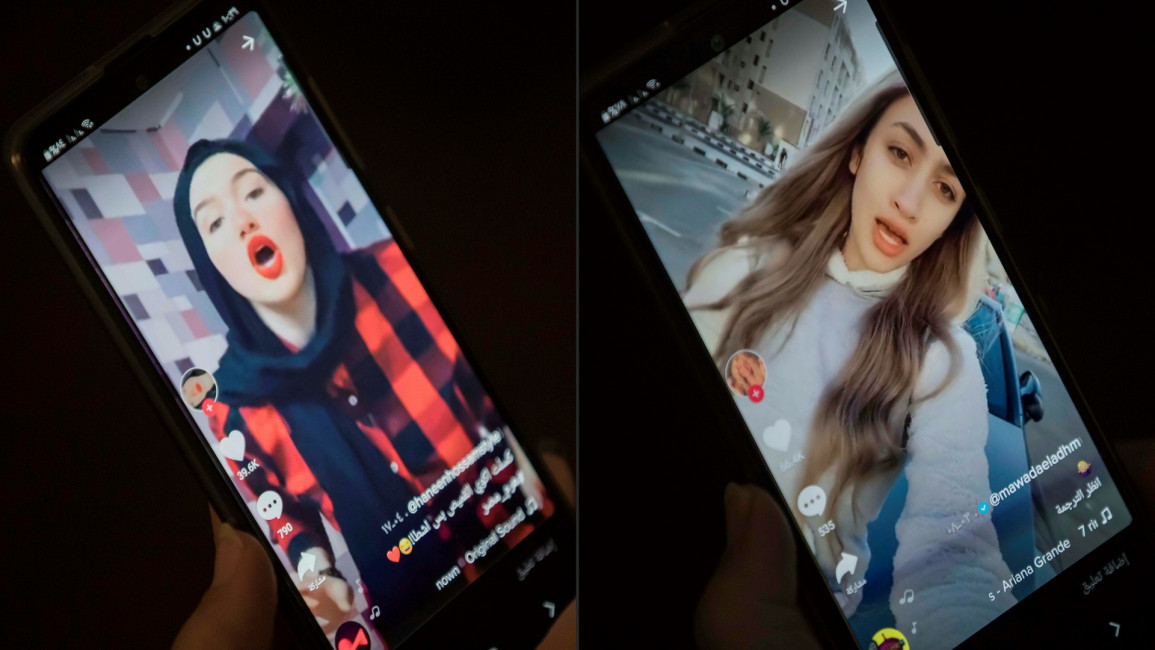Follow us on Facebook, Twitter and Instagram to stay connected
International Day of the Girls: #FreeToBeOnline campaign calls for protection of girls against online harassment
International Day of the Girls: #FreeToBeOnline campaign calls for protection of girls against online harassment
Young women's access to the internet is not only curtailed, but in many places, including in parts of the Middle East, they face many dangers on social media.
4 min read
Haneen Hossam, Mowada al-Adham sentenced to prison for violating public morals on TikTok [Getty]
Over half of girls across the world face abuse online, with the Middle East being a region where they experience particular limitations surrounding access and danger, new research has found, as countries across the world mark Day of the Girls.
Created by the United Nations, Day of the Girls is an international observance day designed to shine light on human rights abuses suffered by girls and young women across the world.
"In 2020, we commemorate 25 years since the adoption of the Beijing Declaration and Platform for Action – the global agenda for advancing the rights and empowerment of women and girls, everywhere," the UN said.
A new survey of 14,000 girls from 22 countries conducted by humanitarian organisation Plan International found that 58% surveyed reported being subjected to abuse online, and one in five "either left or significantly reduced their use of a social media platform after being abused".
In a damning set of statistics, 42% of girls said the online abuse impacted their self-esteem and self-confidence, and some even reported facing online harassment more than they do in public spaces.
As a result of the findings, Plan International launched a campaign called #FreeToBeOnline to advocate for girls' rights to "have access to a safe and secure cyberspace, by calling on social media giants (Facebook, Twitter, Instagram and TikTok) to do their part in safeguarding these platforms for the millions of girls who use them on a daily basis".
"It’s not just about the idea that it's a taboo [to use social media as a girl] and that girls struggle to be on these social media accounts publicly, but at the same time they are not even able to access these spaces," Hiba Alhejazi, Advocacy and Influencing Manager at Plan International told The New Arab.
Focus on MENA
"In the MENA region, there is a taboo around girls' use or visibility on these platforms, and that is highlighted by the fact that many girls and young women are forced to navigate through these online spaces by creating fake accounts that do not display or reflect any identifiable personal features or info," Plan International said.
"And the fear of reprisals felt by girls if discovered is real.
"For example, this year in Jordan, a 14-year-old girl was killed by her brother because she chose to open a Facebook account."
In May, the case prompted widespread anger in Jordan, with citizens publicly calling for the execution of the man for stabbing his little sister to death.
|
A security source told Jordanian news agency Khaberni at the time that the killer, 25, had stabbed her for using his phone to open a social media account.
Young girls in Egypt are also at risk of being arrested for their activities on social media platforms.
Since April, authorities in Egypt launched a targeted campaign against female social media influencers on bogus charges, which violate their rights to privacy, freedom of expression and non-discrimination.
At least 15 people, including a 17-year-old girl, have been arrested on vague charges such as violating "public morals" and "undermining family values".
Aya, the 17-year-old who is known on social media as "Menna Abdelaziz" was arrested on 28 May, six days after she posted a video in which her face appeared to be bruised.
In the video, she said she was beaten by a group of men and women, and alleged that the men raped her, filmed the acts and then blackmailed her for the footage.
Social media and #MeToo
Social media remains a vital vehicle through which women, in particular can raise awareness of discrimination and sexual abuse.
Read more: 'Educate, partner up!' Could Egypt's growing sexual harassment problem usher in a digital #MeToo?
Earlier this year #MeToo re-emerged in Egypt, with female social media influencers leading the charge, following a string of arrests.
The Egyptian authorities "not only want to control what citizens say, but also how they should dress, talk, and behave online," said Marwa Fatafta, Access Now’s group's Middle East and North Africa policy manager said in August.
Morocco had its own reckoning, with mixed results, called ‘The Masaktach’ (I will not be silent).
Led by Moroccan women, the collective launched a call for victim testimonies on February 9: "Denounce these aggressors who act with impunity, comforted by your silence."
The movement's testimonials are posted publicly on their Facebook and Twitter pages, using victims' initials to preserve their anonymity. If several of them denounce the same assailant, upon their consent, the group connects them.

![Widespread famine is imminent in Gaza [Getty Images]](/sites/default/files/styles/image_330x185/public/2024-03/GettyImages-2015647000.jpg?h=199d8c1f&itok=mJWWP_Td)

